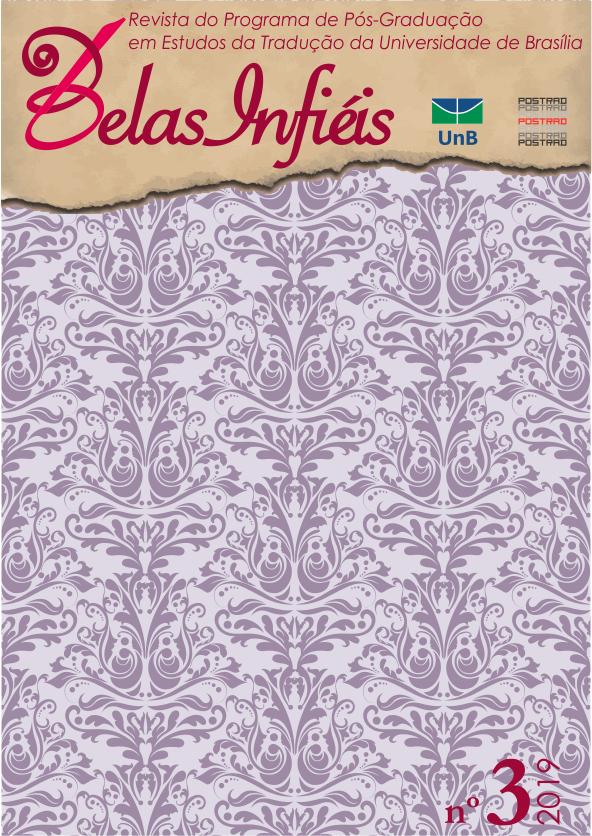Um tipo de mágica: Aspectos da rima em poemas originais e traduzidos
DOI :
https://doi.org/10.26512/belasinfieis.v8.n3.2019.26341Mots-clés :
Rima. Tradução. Poesia. Paráfrase poética. Robert Browning.Résumé
Rimas em poemas originais e traduzidos são o tema deste artigo, seu objetivo sendo analisá-las como cerceamentos potencialmente criativos na escrita original e na tradução. Com esse objetivo, o artigo analisa ideias comumente aceitas sobre rimas, como a suposição de que rimas limitam a expressão, para refutá-las por meio de argumentos girando em torno ao potencial criativo das rimas em poemas originais e em poemas traduzidos, rimas sendo consideradas como convenções ou cerceamentos que, uma vez usadas com propriedade pelo poeta e pelo poeta-tradutor, são um componente da sua originalidade. Desse ângulo, o uso apropriado da rima estaria ligado à criação de contextos logicamente convincentes para as rimas. No caso de traduções poéticas, em que o tradutor não pode senão usar um contexto estrangeiro como ponto de partida para a experiência literária a ser desenvolvida em sua tradução, o contexto estrangeiro é já um cerceamento a mais no caso de rimas, o que prova que os cerceamentos na tradução são maiores do que na escrita original. Essas ideias sobre rima também são apresentadas no artigo como relacionadas a visões pessoais do autor sobre tradução poética, inspiradas por escritos críticos de Jean Boasse-Beier e Michael Hamburger. Segundo os pontos de vista do autor, seguindo os passos de Jean Boasse-Beier, a tradução é uma arte cerceada, e “paráfrases poéticas”, que ele define idiossincraticamente a partir de suas elaborações das idéias seminais de Dryden sobre o assunto, é o expediente que ele escolhe para lidar com cerceamentos na tradução poética. Por fim, o artigo analisa trechos da tradução de O flautista em Hamelin à luz dessas idéias, e inclui uma versão atualizada do poema publicado em décadas anteriores.
Téléchargements
Téléchargements
Publié-e
Comment citer
Numéro
Rubrique
Licence
Copyright Statement
Given the public access to this journal, the texts are free to use but requires the recognition of the original authorship and initial publication in this journal to be properly stated.
The journal allows the use of works published for non-commercial purposes, including the right to submit the work to publicly accessible databases. Published contributions are the sole and exclusive responsibility of the author(s).
- When submitting papers to be evaluated by the Belas Infiéis journal, the author(s):
- Declare that the contents of the contributions are original and of their original creation, being entirely responsible for their content if there is an objection by third parties.
- Claim to be aware that they should not commit academic plagiarism.
- Declare that the manuscript has not been published, completely or partially, in Portuguese or another language. If it is a translation it should be submitted to the Translated Articles section.
- Declare that the manuscript is not being evaluated by other journals.
- Declare that the manuscript was not submitted to another journal simultaneously.
- Commit(s) to inform the journal of any kind of error or inaccuracy in their contribution (published, in evaluation or in editing) and to collaborate with the editors to make due corrections of the article (when in evaluation or editing) or erratum/retraction (after publication).
- Declare that there is no conflict of interest regarding the published work.
- Authorize its release if it is accepted for publication without any kind of monetary compensation.
- Agree to assign non-exclusive rights to publication to the magazine, remaining free to make their contribution available in other media as long as the publication of the first version in Belas Infiéis magazine is mentioned. They also authorize Belas Infiéis to assign their texts for reproduction in content indexers, virtual libraries and similar platforms.
- Maintain copyright and grant the journal the right of first publication, the work being licensed under theCreative Commons Attribution License.
- Is/Are allowed and encouraged to publish and distribute their work online after the editorial process, which may increase the impact and citation of the published work.
- Authorize the editorial team to make textual adjustments and to adapt the article to the publication rules, when necessary.



















